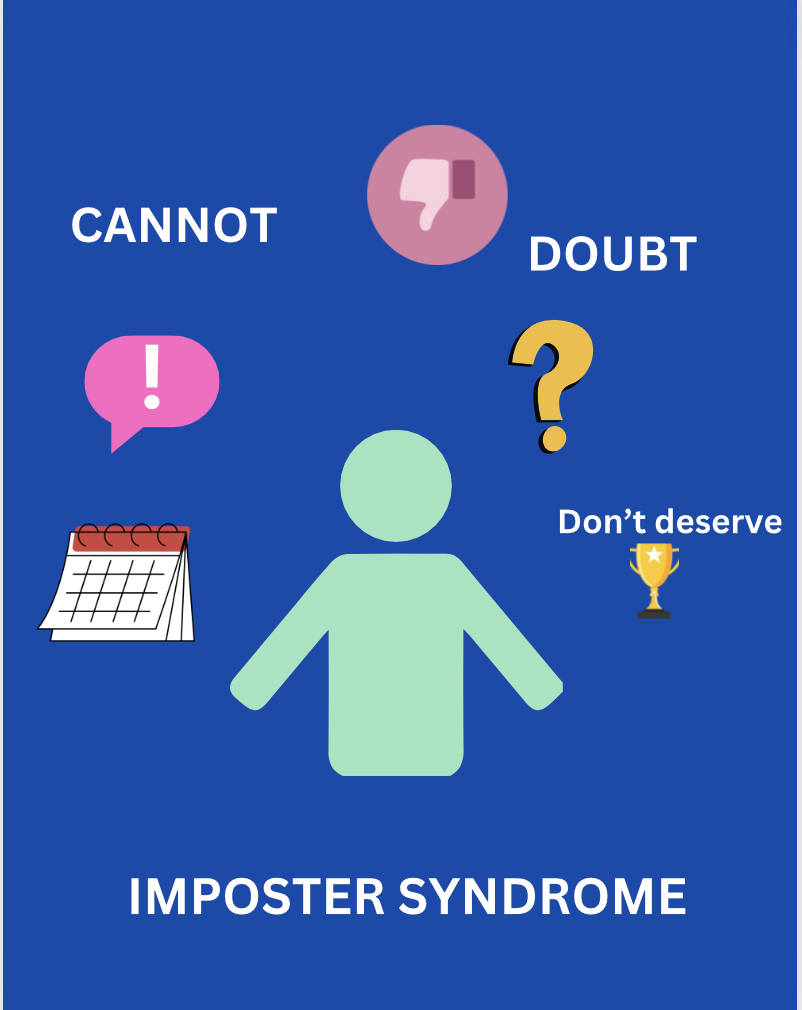I felt honored and confident when first joining the program. It was a gateway to new opportunities and personal and professional development. However, as the classes began, I had an unusual feeling of inadequacy looking around at my smart and intelligent classmates who seemed to have it all figured out.

Despite performing well in the assignments, I hesitated to speak up during class discussions fearing embarrassment because I did not know enough. Fortunately, this feeling was a temporary phase for me and I will explain how I overcame this situation.
What is an Imposter Syndrome?
Imposter syndrome, as defined by Harvard Business Review (HBR), is persistent feelings of inadequacy despite evident success. It triggers anxiety and self-doubt leading to either over-preparation or procrastination. Even after success, the self-doubt lingers. Sometimes, the need to be the best among all or a perfectionist can be overwhelming and we regard ourselves as failures if the goals are unmet.
How to Deal with Imposter Syndrome: The “ABCD” Method
A: Awareness
Being self-aware is first important step to deal with this situation. Many MBA students including myself come from abroad, having left our families behind to start a new chapter at SFU. While we are still adapting to the new environment, the MBA course runs at full speed and there is huge pressure to perform and excel. Being mindful of our situation, and arising feelings, is the key to self-awareness. However, it is easier said than done.
B: Build your support network
Peers, SFU staff (like the program manager), professors, mentors, and SFU counseling services make up the support network. For me personally, reaching out to my peers was the best decision I made. I realized it was not only me who was going through the imposter phase but many of my friends had been constantly experiencing it too. Openly communicating on the topic reassured me and helped me gain my self-confidence back.
C: Cultivate self-compassion
Learning to acknowledge my limitations while recognizing my strengths has been an essential step in my MBA journey. For example, I am not trying to be a perfectionist anymore. Rather, I enjoy the success that my best efforts have reaped.
D: Design realistic goals and take actions
Rather than comparing myself to others, I measured my success based on my progress and growth. I have set achievable goals and also learnt to celebrate incremental milestones to make me stay motivated and focus on my journey.
Has overcoming imposter syndrome been easy?
Certainly not. New challenges await as we transition to job search and intense networking. But right now, with a supportive network and self-compassion, I feel more confident in my ability to tackle the uncertainties in my way.

Key Takeaways
MBA isn’t just about academic excellence, it is about forging lifelong connections and embracing growth opportunities. The smarter classmates should not intimidate us, rather it is an opportunity for mutual learning and growth.
To all my fellow MBA friends, remember;
You belong here!
Your journey to success is as unique as you are!
If you ever have self-doubt, take a deep breath and say I am worthy, and proceed to embody that truth in your actions.
___________________________________________________________
About the Author

Anjana Rajbanshi, a Full-Time MBA candidate at SFU, currently serves as the VP of Communications in the Graduate Business Students Association (GBSA) at Beedie. With 3 years of experience as a Team Lead in a Japanese real estate company, she thrived in a diverse team environment, collaborating with colleagues from nearly 20 countries and clients from 170 nations. An MA in Economics from Tokyo International University complements her professional journey. Beyond academics, Anjana actively volunteers for organizations such as Red Cross, Youth Initiative (Nepal), and Rotary International (Japan). For more, connect with her on LinkedIn.